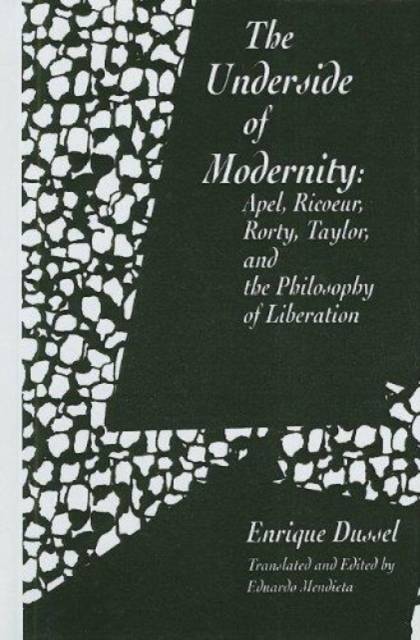
- Afhalen na 1 uur in een winkel met voorraad
- Gratis thuislevering in België vanaf € 30
- Ruim aanbod met 7 miljoen producten
- Afhalen na 1 uur in een winkel met voorraad
- Gratis thuislevering in België vanaf € 30
- Ruim aanbod met 7 miljoen producten
Zoeken
Underside of Modernity
Apel, Ricoeur, Rorty, Taylor, & the Philosophy of Liberation
Enrique Dussel
Paperback | Engels
€ 131,45
+ 262 punten
Omschrijving
Until now, North American and European philosophies have been engaged in debates about the possibility of a postmetaphysical philosophy and the consequences of the linguistic turn for the assessment of modernity; they have done so, however, without departing from the narrow horizons of their respective nationalistic perspectives. In this incisive critique, Dussel demonstrates how most of thse philosophies have either failed to give historically faithful analyses of the genesis of the "myth" of modernity, or have never engaged in a serious questioning of their own Eurocentric presuppositions. He shows how North American and European philosophers have presupposed a no-longer-acceptable philosophy of history that has led them to fall into a "developmental fallacy," the belief that there is a linear sequence that moves from the premodern, underdeveloped, or on the way to industrialization, to the modern, developed, and industrialized.
Specificaties
Betrokkenen
- Auteur(s):
- Uitgeverij:
Inhoud
- Aantal bladzijden:
- 280
- Taal:
- Engels
Eigenschappen
- Productcode (EAN):
- 9781573923965
- Verschijningsdatum:
- 4/09/1998
- Uitvoering:
- Paperback
- Formaat:
- Trade paperback (VS)
- Afmetingen:
- 140 mm x 203 mm
- Gewicht:
- 417 g

Alleen bij Standaard Boekhandel
+ 262 punten op je klantenkaart van Standaard Boekhandel
Beoordelingen
We publiceren alleen reviews die voldoen aan de voorwaarden voor reviews. Bekijk onze voorwaarden voor reviews.








